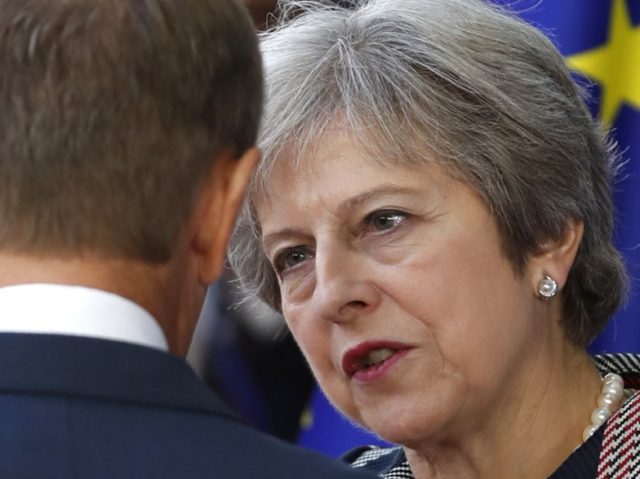Britain’s Prime Minister Theresa May used a Commons statement Monday to reject outright calls for a second referendum on membership of the European Union, but said nevertheless extending the so-called transition period where the United Kingdom is still in the European Union in all but name could be “preferable”.
The statement came after a weekend of intensifying plotting in Westminster — both by the Prime Minister’s pro-Brexit Tory colleagues against her, and by pro-remain campaigners who, emboldened by a protest march on Saturday, have vowed “the most co-ordinated lobbying effort ever conducted on a piece of legislation.”
Twisting the Knife: Remainers Try to Kill Off Brexit Debate with Language Control https://t.co/EPNjcuwV2i
— Breitbart London (@BreitbartLondon) October 22, 2018
The march organisers have attempted to package the move to force Britain to vote again on whether it wants to leave the European Union again — having already voted against the wishes of the European Union in 2016 — as the ‘People’s Vote’. In an unusual moment of clarity Monday afternoon the Prime Minister dismissed the claim, stating that a second vote would be a “politicians’ vote”, not a people’s one, and ruled out the plan.
Acknowledging clearly that those calling for a second vote are only doing so out of a desire to stop Brexit from happening altogether, May told the Commons: “Serving our national interest will demand that we hold our nerve through these last stages of the negotiations – the hardest part of all.
“It will mean not giving in to those who want to stop Brexit with a politicians’ vote. Politicians telling the people they got it wrong the first time and should try again.”
UK Deep State ‘Wargames’ Second EU Referendum as ‘Most Co-Ordinated Lobbying Effort Ever’ Begins https://t.co/49XySl6CLo
— Breitbart London (@BreitbartLondon) October 22, 2018
Moving to reassure those Brexit rebels in her own party that are growing bolder in their moves to undermine and potentially remove the PM from post, May said the Brexit deal was now “95% done”, and that now was the time to “hold our nerve”.
More concerning for Brexiteers was May’s comments on the revelations last week that the so-called Brexit transition period could stretch further into the future than previously admitted, and would see Britain still obeying European Union laws, and paying billions more into the EU budget.
May said the transition would now have to be over before the next general election in 2022 — which would take the time between the Brexit vote to Britain actually leaving the European Union to nearly six years. She told the Commons: “…there are some limited circumstances in which it could be argued that an extension to the implementation period might be preferable, if we were certain it was only for a short time.
“For example, a short extension to the implementation period would mean only one set of changes for businesses – at the point we move to the future relationship. But in any such scenario we would have to be out of this implementation period well before the end of this parliament.”
‘The Problem Isn’t Brexit. It’s the PM’: Anger as Appeaser Theresa Pushes For Further Brexit Delay https://t.co/5GyMP3oeIZ
— Breitbart London (@BreitbartLondon) October 18, 2018
Brexit leader Nigel Farage joined others in criticising May’s leadership over Brexit Monday. Writing in the Daily Telegraph that the EU has no intention of letting Britain set its own policies even after officially leaving, he said: “So far, Theresa May has proved incapable of escaping this bullying [EU] monster. I wonder what it will take for her to understand the severity of the punishment which the EU bully boys wish to inflict on us.
“Theresa May is in a weak position because of the submissive stance she has consistently shown when dealing with Brussels. As a result, Britain is in danger of wasting the opportunities of Brexit.”

COMMENTS
Please let us know if you're having issues with commenting.